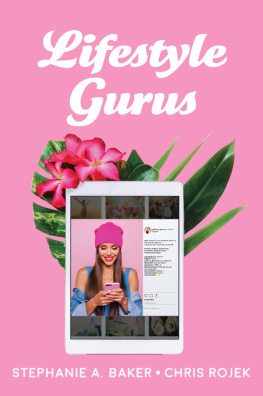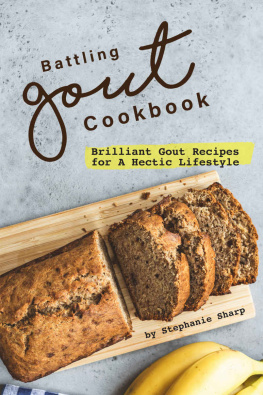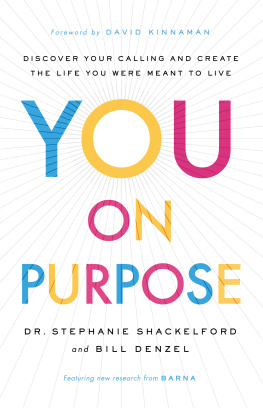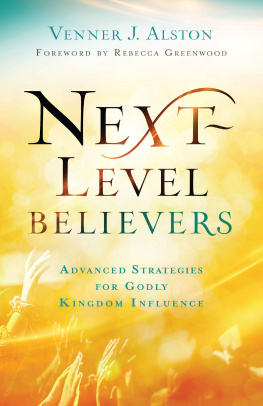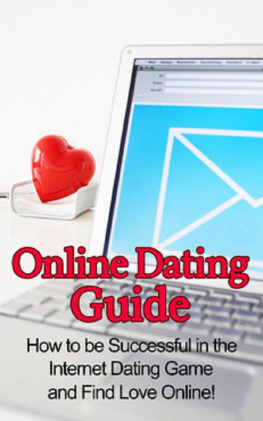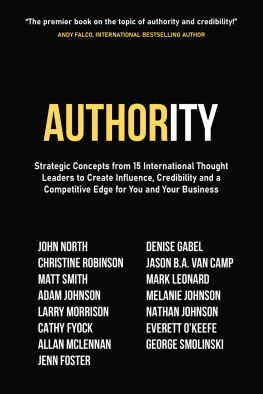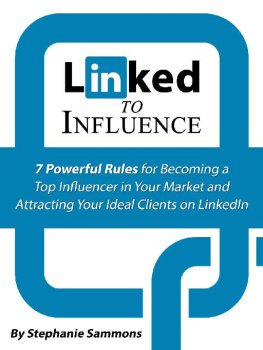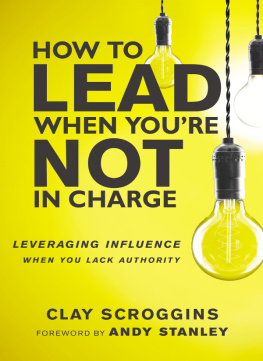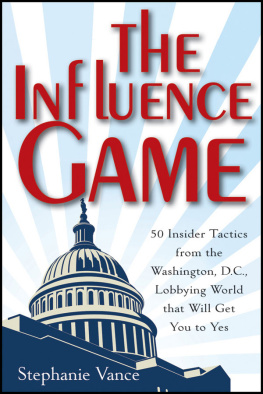Stephanie A. Baker - Lifestyle Gurus: Constructing Authority and Influence Online
Here you can read online Stephanie A. Baker - Lifestyle Gurus: Constructing Authority and Influence Online full text of the book (entire story) in english for free. Download pdf and epub, get meaning, cover and reviews about this ebook. year: 2020, genre: Politics. Description of the work, (preface) as well as reviews are available. Best literature library LitArk.com created for fans of good reading and offers a wide selection of genres:
Romance novel
Science fiction
Adventure
Detective
Science
History
Home and family
Prose
Art
Politics
Computer
Non-fiction
Religion
Business
Children
Humor
Choose a favorite category and find really read worthwhile books. Enjoy immersion in the world of imagination, feel the emotions of the characters or learn something new for yourself, make an fascinating discovery.
- Book:Lifestyle Gurus: Constructing Authority and Influence Online
- Author:
- Genre:
- Year:2020
- Rating:4 / 5
- Favourites:Add to favourites
- Your mark:
- 80
- 1
- 2
- 3
- 4
- 5
Lifestyle Gurus: Constructing Authority and Influence Online: summary, description and annotation
We offer to read an annotation, description, summary or preface (depends on what the author of the book "Lifestyle Gurus: Constructing Authority and Influence Online" wrote himself). If you haven't found the necessary information about the book — write in the comments, we will try to find it.
Lifestyle Gurus: Constructing Authority and Influence Online — read online for free the complete book (whole text) full work
Below is the text of the book, divided by pages. System saving the place of the last page read, allows you to conveniently read the book "Lifestyle Gurus: Constructing Authority and Influence Online" online for free, without having to search again every time where you left off. Put a bookmark, and you can go to the page where you finished reading at any time.
Font size:
Interval:
Bookmark:

STEPHANIE A. BAKER AND CHRIS ROJEK
polity
Copyright Stephanie A. Baker and Chris Rojek 2020
The right of Stephanie A. Baker and Chris Rojek to be identified as Authors of this Work has been asserted in accordance with the UK Copyright, Designs and Patents Act 1988.
First published in 2020 by Polity Press
Polity Press
65 Bridge Street
Cambridge CB2 1UR, UK
Polity Press
101 Station Landing
Suite 300
Medford, MA 02155, USA
All rights reserved. Except for the quotation of short passages for the purpose of criticism and review, no part of this publication may be reproduced, stored in a retrieval system or transmitted, in any form or by any means, electronic, mechanical, photocopying, recording or otherwise, without the prior permission of the publisher.
ISBN-13: 978-1-5095-3017-5 (hardback)
ISBN-13: 978-1-5095-3018-2 (paperback)
A catalogue record for this book is available from the British Library.
Library of Congress Cataloging-in-Publication Data
Names: Baker, Stephanie Alice, 1983- author. | Rojek, Chris, author.
Title: Lifestyle gurus : constructing authority and influence online / Stephanie Baker, Chris Rojek.
Description: Medford : Polity Press, [2019] | Includes bibliographical references and index. | Summary: The rise of blogs and social media has facilitated an industry of self-appointed lifestyle gurus who have become instrumental in the management of intimacy and social relations. Baker and Rojek trace the rise of lifestyle influencers in the digital age, relating this development to the erosion of trust in the expert-professional power bloc-- Provided by publisher.
Identifiers: LCCN 2019020142 (print) | LCCN 2019980575 (ebook) | ISBN 9781509530182 (paperback) | ISBN 9781509530175 (hardback) | ISBN 9781509530205 (epub)
Subjects: LCSH: Social media. | Influence (Psychology) | Power (Social sciences) | Interpersonal relations. | Collective behavior.
Classification: LCC HM1206 .B354 2019 (print) | LCC HM1206 (ebook) | DDC 302.23/1--dc23
LC record available at https://lccn.loc.gov/2019020142
LC ebook record available at https://lccn.loc.gov/2019980575
Typeset in 11.25 on 13 Dante
by Fakenham Prepress Solutions, Fakenham, Norfolk NR21 8NL
Printed and bound in the UK by by CPI Group (UK) Ltd, Croydon
The publisher has used its best endeavours to ensure that the URLs for external websites referred to in this book are correct and active at the time of going to press. However, the publisher has no responsibility for the websites and can make no guarantee that a site will remain live or that the content is or will remain appropriate.
Every effort has been made to trace all copyright holders, but if any have been overlooked the publisher will be pleased to include any necessary credits in any subsequent reprint or edition.
For further information on Polity, visit our website: politybooks.com
Stephanie thanks Ian, Viola and Juliette, family and friends, who provided support at the time of writing this book.
City, University of London, have been generous in granting Stephanie a sabbatical, which assisted with the research for, and writing of, this book.
Chris would like to thank Luke, Kate, Amelie and Chloe, Eugene McLaughlin, Simon Susen, Barry Smart, Dan Cook, Maggie ONeill, George and Sue Ritzer.
Stephanie and Chris would also like to thank the anonymous reviewers, who provided useful feedback on this manuscript, and the staff at Polity including John Thompson, Mary Savigar and Ellen MacDonald-Kramer for bringing this book into print.
Our study of lifestyle gurus began in 2015 with the case of Belle Gibson. Gibson presented herself online as a cancer survivor. She claimed that she healed herself from terminal brain cancer by adhering to a healthy diet and lifestyle, rejecting conventional cancer treatments in favour of natural remedies. Using her blog and social media to document her experience, she created an online persona based around inspirational quotes, attractive selfies, healthy recipes and a general air of presumed intimacy. Gibson used these technologies to build an online community of over 200,000 followers. Her claims of self-recovery formed the basis of her online persona and successful global brand, with a bestselling app available on Apple, an international book deal with Penguin and series of public accolades built around her narrative of survival. Gibsons association with Apple and Penguin gave her story a sense of legitimacy and extended her global reach. Comprised of a collection of recipes, her book and app were about more than food; they were framed more broadly under the rubric of lifestyle philosophy as guides on how we should live, combating stress, achieving wellness and a healthy, wholesome lifestyle. In short, Gibsons products were marketed to consumers as manuals filled with good advice on promoting better living (Barker 2014).
The moral payload of Gibsons message was the unexamined assumption that most people do not live well and do not know how to acquire good advice to remedy the problem. Part of the appeal of Gibsons story was that she provided many of those suffering from cancer with hope. If Gibson was able to cure herself from cancer through nutrition and adopting a healthy lifestyle, perhaps others could do the same. Her audience was comprised of those who were ill, as well as health-conscious individuals seeking to optimise their well-being. Gibson, referred to on Instagram as @healing_belle, presented herself as a wellness guru and an advocate of clean eating. She not only claimed to adhere to clean eating principles by restricting her consumption of coffee, gluten and dairy, she also rejected conventional cancer treatments, such as chemotherapy and radiotherapy. In this respect she was distrustful of elite-professional interventions. She advocated alternative therapies, inspiring her followers to do the same.
In 2015, Gibson was exposed as a fraud. It was revealed that she never had cancer and failed to donate the $300,000.00AUD in proceeds from her book and app, The Whole Pantry, to charity, as promised. The scandal caused public outrage and prompted a series of questions: How was Gibson able to pull the wool over the eyes of so many people, including her followers and many branches of popular media? Why did the companies who promoted her products fail to verify whether she had cancer by fact-checking her claims? Why were people so willing to believe the advice of someone they followed online over established medical expertise? Our interest in exploring these questions was the impetus for writing this book. The more we considered this topic, the more we realised that the scandal spoke to a larger cultural phenomenon at play: the rise of lifestyle gurus in the digital age and, by extension, the crisis of confidence in the interventions of experts and professionals.
People go online to make sense of the world around them. Most of us use Google on a daily basis to search for mundane information: directions, transport times and weather updates. We also routinely use social media to connect with friends and social networks online. However, more than ever before, the internet is where we turn when we are lonely, concerned or afraid. Protected with the anonymity afforded by most forms of digital communication, the internet provides us with the capacity to explore many of lifes most pressing questions in secret with those whom we perceive to be just like ourselves. Without doubt, this shared experience can be extremely rewarding, providing rich emotional connections in the form of online chat rooms, support groups and forums. The interactions enabled by these technologies can also foster meaning, identity and a sense of belonging. This is especially the case when individuals feel excluded and misunderstood by their immediate community, family and friends. Whereas in former times, one might have turned to a novel or film in times of need, the internet now provides a plethora of advice and solutions to lifes eternal problems. What these media share in common is their capacity to facilitate a sense of mimetic vertigo, the recognition that the object represented also represents you (Taussig 1992). Their significance lies in the fact that they speak to the subject directly, while enabling them to reflect on their concerns at a safe aesthetic distance; achieving emotional pertinence through fusing the subject and object into a common narrative (Baker 2014). One of the key differences between novels, films and the stories documented online, is that the protagonist we read about online can speak back. The direct forms of communication afforded by social media enable users to engage in dialogic exchange with the protagonists they read about online. They can also communicate in visual form via images and videos, enhancing the feeling of proximity and intimate exchange.
Next pageFont size:
Interval:
Bookmark:
Similar books «Lifestyle Gurus: Constructing Authority and Influence Online»
Look at similar books to Lifestyle Gurus: Constructing Authority and Influence Online. We have selected literature similar in name and meaning in the hope of providing readers with more options to find new, interesting, not yet read works.
Discussion, reviews of the book Lifestyle Gurus: Constructing Authority and Influence Online and just readers' own opinions. Leave your comments, write what you think about the work, its meaning or the main characters. Specify what exactly you liked and what you didn't like, and why you think so.

